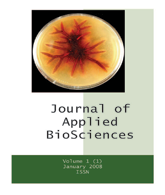Journal of Applied Biosciences (J. Appl. Biosci.) [ISSN 1997 - 5902]
Volume 51: 3642 - 3651. Published March 29, 2012.
Effet de l’inoculation par une souche osmotolerante de Rhizobium sullae sur la croissance et la production en proteine du sulla (Sulla coronarium L.) sous déficit hydrique
Fitouri Dhane Sana1*, Ben Jeddi Faysal1, Zribi Kais2, Rezgui Salah1 et Mhamdi Ridha2
1 Institut national agronomique de Tunisie 43, avenue Charles Nicolle 1082 Tunis Tunisie.
2 Laboratoire des Légumineuses Centre de Biotechnologie de Borj-Cédria BP 901 Hammam-lif 2050, Tunisie.
* Auteur correspondance Email : [email protected]
RESUME
Objectif : La production de protéines végétales en conditions de déficit hydrique est un problème qui ne cesse de fragiliser le secteur de l’élevage ovin et bovin en Tunisie. L’inoculation rhizobiale du sulla cultivé peut contribuer à l’amélioration de la production de fourrage riche en protéines.
Méthodologie et résultats: Des plants de sulla (Sulla coronarium L.) cultivés en pots de végétation, ont été inoculés par une souche de Rhizobium sullae HC14 puis soumis à différents régimes hydriques (75, 50, et 25 % de la réserve utile du pot (RUP: 300 mm)). Un deuxième essai a été conduit parallèlement sur champ en pluvial dans deux sites du semi-aride supérieur (Tunis et Goubellat). L’essai en pots a montré qu’avec 75 % de RUP, la fertilisation rhizobiale est au moins équivalente à celle azotée (90 unités), avec un rendement protéique 2,5 fois plus important. A 50% de RUP, le rendement protéique assuré par la symbiose est 3 fois plus que celui avec l’apport azoté. Au champ, l’inoculation du sulla a varié selon le site. A Goubellat l’inoculation a amélioré la croissance en hauteur et les rendements protéiques par rapport au témoin non fertilisé respectivement de 80 % et 277 %. Alors qu’à Tunis l’inoculation a amélioré la croissance en hauteur du sulla de 23 % sans significativement augmenter ses rendements protéiques.
Conclusion et application: L’inoculation par la souche HC14 peut contribuer à l’amélioration de la production de sulla dans les régions marquées par un déficit hydrique. Cette pratique permet une valorisation écologique des sites marginalisés de la Tunisie septentrionale.
Mots clés: Sulla coronarium L., Fixation de l’azote, Inoculation, Rhizobium, Stress hydrique.
Effect of inoculation with osmotolerant strain of Rhizobium sullae on growth and protein production of sulla (Sulla coronarium L.) under water deficit
Objective: Plant protein production under water stress conditions is a problem that constantly weakens the sector of sheep and cattle grazing in Tunisia. Rhizobial inoculation of cultivated Sulla may contribute to improving the production of protein-rich fodder.
Methodology and results: Plants of Sulla (Sulla coronarium L.) cultivated in pots were inoculated with an organic fertilizer based on the rhizobial strain HC14 and then submitted to different water regimes (75, 50, and 25% of useful reserves of the pot (URP: 300 mm)). This trial was carried in non-irrigated fields at two locations (Tunis and Goubellat). The pot experiment showed that with 75% of URP, rhizobial fertilization is at least equal to nitrogen fertilization (90 units), with 2.5 times more protein. At 50% URP, protein yield provided by symbiosis is three times more than with the nitrogen supply. In the field, rhizobial inoculation of Sulla has stabilized or improved forage yield and protein according to site. In Goubellat inoculation improved the growth in height and protein yields compared to the unfertilized control respectively 80% and 277%. Whereas in Tunis inoculation improved the growth in height of sulla 23% with no significantly increasing its protein yields.
Conclusion and application: Inoculation with strain HC14 can contribute to improving sulla production in water deficit regions. This practice allows an ecological enhancement of marginalized northern Tunisia sites.
Keywords: Sulla coronarium L., Nitrogen fixation, inoculation, Rhizobium, Water deficit.
FULL PAPER [PDF AVAILABLE HERE]
